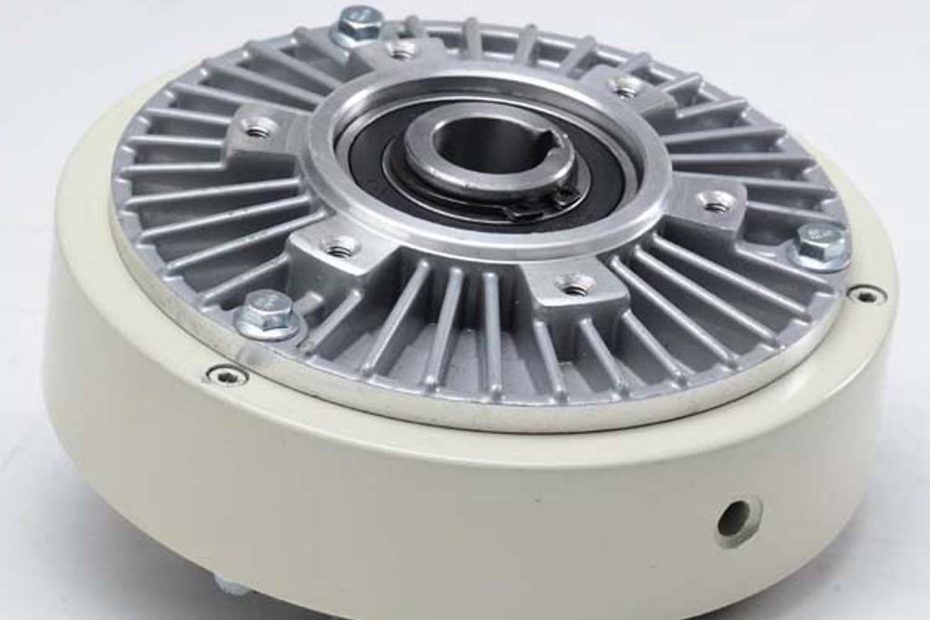Material testing is a critical domain in engineering and research, demanding precise control and measurement.The need for precise control over torque and speed during experiments has driven engineers and researchers to seek braking systems that can offer precision.
Magnetic particle brakes, with their unique mechanism, have emerged as the solution to this imperative need for precision in material testing machines.In recent times, magnetic particle brakes have risen to prominence, becoming the preferred choice in material testing machines.
What Is Magnetic Particle Brakes
Magnetic particle brake is a kind of magnetic powder filled in the working gap between the stator and the rotor. It uses the binding force between the magnetic particle and the friction force between the magnetic particle and the working surface generated by the electromagnetic attraction to transmit power and motion, and can control and adjust the torque. braking device.
Simply put, magnetic particle brakes are based on electromagnetic principles and use magnetic particle to transmit torque. The equipment has fast response speed, simple structure, no pollution and no noise. It is mainly used for mechanical transmission systems that require braking and control systems that require speed regulation, tension control, test loading, etc.
Functional Characteristics Of Magnetic Particle Brake
- High-precision torque control. The torque control range is very wide, and the control accuracy is high. The torque and excitation current are conveyed in the correct ratio, and high-precision control can be achieved.
- Superior durability and long life. It adopts super alloy magnetic powder with strong heat resistance, wear resistance, oxidation resistance and corrosion resistance, and has a long service life.
- Constant torque characteristics with excellent stability. Magnetic powder has good magnetic properties, and the bonding force between the powder particles is stable. The sliding torque is very stable and can maintain a constant torque for a long time regardless of the relative rotation number.
- Used in continuous sliding operation. It adopts a cooling structure with excellent heat dissipation effect and uniform thermal deformation, coupled with the high heat resistance of magnetic powder, allowing high connecting and braking power and sliding power, and it can slide smoothly without causing vibration.
- The connection is smooth and has no impact. The impact when connecting is extremely small, and it can start and stop smoothly without impact. Moreover, the resistance torque is extremely small and will not cause useless heat generation.
- Suitable for high-frequency operation. Fast response and special heat dissipation structure, suitable for high-frequency operation.
- Lightweight, maintenance-free and long life. The model is simple and lightweight, using high-temperature-resistant coils and special grease bearings, and special wear-resistant treatment is applied to the armature that is prone to wear to extend its service life.
advantage of magnetic particle brakes in material testing machines
Material testing often involves a diverse range of specimens, each with its unique mechanical properties. Magnetic particle brakes offer a distinct advantage with their ability to provide variable torque adjustment.
| Feature | Description |
|---|---|
| Torque Control | Enables precise adjustment of braking force |
| Speed Regulation | Allows for accurate control of rotational speed |
| Consistency | Maintains a consistent braking performance over time |
| Repeatability | Ensures repeatability in experiments, reducing variability |
Application Diversity
The versatility of magnetic particle brakes extends beyond material testing machines. Their adaptability makes them suitable for a variety of applications, enhancing their overall appeal. Below is a list showcasing the diverse applications of magnetic particle brakes:
- Research and Development: Magnetic particle brakes find application in R&D environments where precise torque control is essential for prototyping and experimentation.
- Quality Control: Industries focusing on quality control benefit from the consistent and repeatable braking performance of magnetic particle brakes, ensuring the reliability of their testing processes.
- Product Manufacturing: The ability to adjust braking force makes magnetic particle brakes valuable in manufacturing processes where different components require distinct levels of torque control.
Conclusion
The smooth and controlled operation of testing equipment is paramount for reliable and accurate results. Magnetic particle brakes, by nature of their design, operate without mechanical contact, reducing the likelihood of jerky movements or sudden changes in torque. This smooth operation contributes to the overall stability of material testing machines, eliminating potential sources of error and enhancing the credibility of experimental outcomes.
The ascent of magnetic particle brakes in material testing machines is fueled by their precision advantage, variable torque adjustment, smooth operation, low maintenance requirements, temperature resilience, and application diversity. As technology progresses, these brakes are poised to play an increasingly pivotal role in shaping the landscape of material testing, providing engineers and researchers with the tools they need for accurate, reliable, and versatile experimentation.
